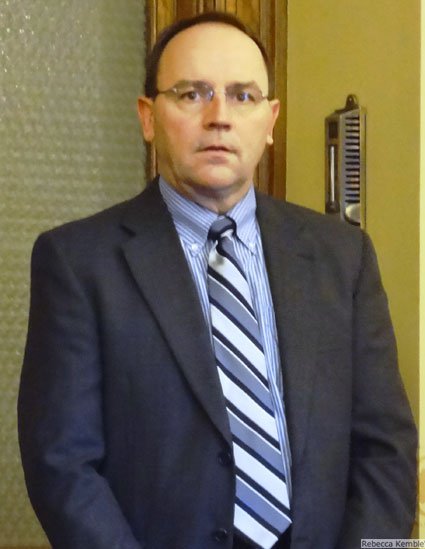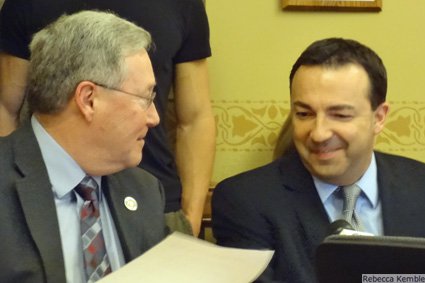It’s “silly season” in the Wisconsin State Legislature. Only two weeks remain in the 2011-2012 legislative session before they break for campaigning, and there is still a huge backlog of bills yet to be voted upon by the two houses and forwarded onto Governor Scott Walker’s desk. This year, the urgency is especially acute due to the John Doe investigation circling closer and closer to Walker himself, and the recall campaigns against Walker, Lt. Governor Rebecca Kleefisch, and four Republican state senators.
On Tuesday there were no fewer than fourteen legislative committees holding public hearings and executive sessions on dozens of bills. Legislators who serve on more than one of those committees scurried in and out of the various meetings. Here’s a sampling of a few of the bills that were under consideration:
· Assembly Election and Campaign Reform: Changing rules for how and why an elected official can be recalled.
· Assembly Energy and Utilities: Allowing nuclear power plants to pay cash-starved municipalities for dry storage of spent nuclear fuel rods.
· Senate Education: Creating a “special needs scholarship” program that siphons off federal special education funds from public schools to give to private schools that don’t have to provide the same services as public schools.
· Senate Judiciary, Utilities, Commerce and Government Operations: A “Taxpayers Bill of Rights” Constitutional Amendment that limits the taxing authority of various units of government.
· Senate Natural Resources: Allowing people who kill bear, wild turkey or other game animals with their car to tag and keep the carcasses.
I spent most of the day in this last committee. The so-called road kill bill was one of the first to be heard. Its author, Rep. Tom Tiffany (R-Hazelhurst) joked, “this is my job creation bill,” a reference to the fact that few if any of the bills passed by this legislature have created any jobs. Indeed, Wisconsin leads the nation in job loss.
Other bills concerning hunting with crossbows, creating a private fund to support state conservation work, the sale of non-edible parts of legally killed animals, and a special priority on the state’s purchase of land in the Niagara Escarpment were also brought forward in the hearing.
But the bill that drew most testimony was the proposal to open a hunting season on the Grey Wolf, just recently taken off the Endangered Species list. SB 411 would allow people to trap wolves with cable restraints and leg hold traps. These are traps that keep the animal alive. The hunter would be permitted to kill the trapped animal any way they choose, including clubbing. It also allows for people to use pack dogs to hunt wolves as they do in bear hunting, and permits people to hunt wolves at night using flashlights and night vision goggles.
I wrote about the Assembly Natural Resources Committee hearing on the same bill a few weeks ago. The bill was passed out of that committee last week on a 13 – 1 vote after a few amendments were made. Many of the same people came to testify in the Senate hearing today sharing much of the same information, but also having a thing or two to say about the process.
The bill’s co-authors, Sen. Terry Moulton (R-Chippewa Falls) and Rep. Scott Suder (R-Abbotsford), said the bill was necessary for public health and safety. Suder claimed that, "This is a wolf management bill. It allows our citizens to protect their land, property, and livelihood," while Moulton said, "The wolf population is out of control! The population has increased 300% in 12 years!"
Wait, isn’t population growth the whole point of nearly-extinct animals having federal protections from hunting? That the Grey Wolf population grew from around 250 animals in the entire state in 2000 to just under 800 in 2012 cannot really be characterized as "out of control."
Four representatives from the Bear Hunters Association testified in favor of the bill. A few times they came close to admitting that they wrote it. Bob Welch, lobbyist for the Bear Hunters and other extreme blood sport organizations said, “We believe the stars are aligned at this time and the process was done right this time to get the bill passed. We hired the best lawyer in D.C., the former head of US Fish & Wildlife, to defend delisting. We support the hunting techniques in the bill because hunting wolves is difficult. Without those tools you aren’t going to be able to harvest wolves.”
Scott Meyer, a member of the Bear Hunters Association and lobbyist for United Sportsman, went even further. He said, “"Seven attorneys were involved with drafting this bill to make sure it didn’t put delisting in jeopardy. The bill is not liberal enough, but unfortunately, these are the cards we’ve been dealt. The idea that we’re going to extirpate the wolves is ludicrous.”
The bulk of testimony was against the bill, and most people mentioned the rushed and secretive process with which it was written and introduced into committee. Two retired DNR wildlife biologists and five faculty members from the University of Wisconsin who specialize in wildlife ecology and biology testified “for informational purposes only.” All but the one who does work for the Bear Hunters Association slammed the committee for not considering scientific data or recommendations while crafting the bill.
Dr. Adrian Treves, Director of the Carnivore Coexistence Lab at the Gaylord Nelson Institute for Environmental Science, was “dismayed that wolf biologists from the DNR were not required to testify.” He further stated that the provisions of the bill “reflect a vocal minority which will unify opponents – hunters and non-hunters — who have otherwise not collaborated. The result will be state litigation under the Public Trust Doctrine.”
Among the citizens testifying was Patricia Randolph, who pointed out the fallacy of the “public safety” rationale for the bill. “There has never been an unprovoked attack on a human by a wolf in North America. Never.” She went on to accuse the committee and the Bear Hunters of collusion and fraud, charges heard more frequently around the capitol: “On January 28, the Bear Hunters Association had an alert to their members on their website, three days before public knew about this bill. Scott Suder and I were scheduled to be on Wisconsin Public Radio on February 2, so he scheduled the Assembly hearing for February 1 before the public could get wind of the bill.”
In writing about the ALEC connections to the Special Education Scholarship bill in his blog Badger Democracy, Scott Wittkopf states, “collusion exists when government and legislators ignore the needs and best interests of the people they serve, and legislate to the highest bidder.” The Senate Natural Resources Committee – which includes three of the four recalled senators who will be facing elections this spring – appears to be legislating to the very narrow interest of the Bear Hunters. They will convene in executive session to vote on the bill before the week is out.
Rebecca Kemble is an Anthropologist who studied decolonization in Kenya. She serves on the Board of the US Federation of Worker Cooperatives and as the President of the Dane County TimeBank.

